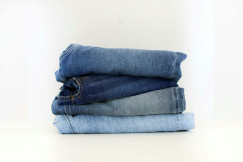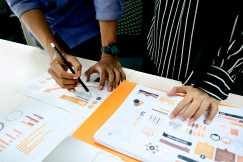Best practices
08 June 2025
Connecting the dots: How RREUSE bridges social enterprises and institutions for circular success
Best practices
08 June 2025
R&I, techniques and technological solutions
Social dimension
Sustainable competitiveness
+3 more
Login / create an account to be able to react
-
48

RREUSE is a European network uniting social enterprises in the field of reuse and recycling, especially textiles. Actively engaged in EU policy development, RREUSE provides expert guidance on new regulatory frameworks, including the revised Waste Framework Directive and EPR schemes. Its newly published guidelines offer practical advice for textile stakeholders on adapting to the upcoming requirements.
RREUSE
Topics
Belgium
Business Support Organisation
Company with 250 or more employees
Cluster Organisations
Consumer Organisations
Industry Associations and Chambers of Commerce
NGOs / Non-profits
SMEs (a company with less than 250 employees)
Social Economy Entity
-
Transition Pathway's building blocks
-
-
R&I, techniques and technological solutions
-
Social dimension
-
Sustainable competitiveness
-
Regulation and public governance
-
-
Industrial ecosystems
-
-
Textile
-
-
Textiles ecosystem areas
-
-
Waste management, reuse and repair
-
Share
About RREUSE
RREUSE is a network of social enterprises active in reuse, repair, and recycling across Europe. With 34 members, over half engaged in textile waste management, RREUSE members collectively handle 337,000 tonnes of textiles annually, with 47,000 tonnes being reused locally.
Recently appointed to the European Commission's expert group on waste, RREUSE actively shapes EU policies through collaboration with policymakers and stakeholders. The organisation serves as a bridge between social enterprises and EU institutions, facilitating cross-border networking and knowledge exchange on best practices and policy developments through member sessions and tailored communication channels.
A Guidance to Navigate the Revised Waste Framework Directive
In May 2025, RREUSE published a practical guidance document on the revised EU Waste Framework Directive, focusing on new EPR obligations for textiles.
The resource is intended to help RREUSE members understand and adapt to the forthcoming regulatory changes that will affect how textile waste is managed across the European Union.
Structured in an FAQ format, the document covers key aspects such as implementation timelines, EPR requirements and obligations for textile producers, the role of various stakeholders including social economy entities, fee structures including eco-modulation based on sustainability criteria, separate collection systems, sorting requirements, regulations for textile shipments, reporting obligations, and transparency requirements. The document also mentions the planned revision of the directive by the end of 2029, which will evaluate the effectiveness of these schemes and potentially introduce new targets and financial contribution requirements.
RREUSE’s Projects: Building Circular Solutions Across Sectors
Through its active involvement in a diverse portfolio of initiatives, RREUSE drives forward a social and circular economy on multiple fronts. EU funded projects like CISUTAC, BuySocCirc, and LOWaste focus on developing and scaling circular business models in textiles, reuse partnerships, and second-life product markets. Digital innovation is at the core of DigiSocCirc project, helping social enterprises harness technology to enhance their impact and resilience. Policy and systemic change are tackled through WISESHIFT and Public Procurement for Climate and Social Benefits, which promote inclusive socio-economic transitions and sustainable public purchasing. Meanwhile, sector-specific knowledge building is central to projects like Furniture and Mattresses Circularity and QualiProSecondHand, which explore new strategies, training needs, and quality standards to professionalise and expand the reuse sector.
Comments (0)
See also
-
26
The Discover Natural Fibres Initiative: a model for textile industry collaboration
- Categories
- Infrastructure Investments and funding R&I, techniques and technological solutions +6 more
-
38
Prolonging the lifespan of denim: repair and reuse services at Nudie Jeans
- Categories
- R&I, techniques and technological solutions Skills Social dimension +10 more
-
35
BALI Chair: Multi-stakeholder collaboration as a driver of systemic change
- Categories
- R&I, techniques and technological solutions Skills Social dimension +9 more




